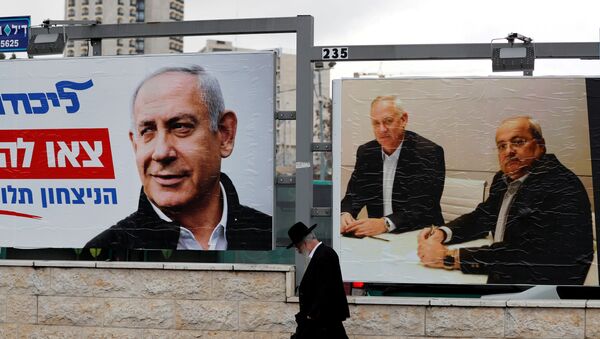On Wednesday, President Reuven Rivlin called upon Prime Minister Benjamin Netanyahu and Kahol Lavan's Benny Gantz to adopt his plan envisaging the formation of a unity government to end the longstanding political stalemate. As of yet, neither Likud nor Kahol Lavan has managed to create a governing coalition prompting speculations about a fourth vote.
The president is due to appoint a Knesset leader to form a government by 17 March, the day Netanyahu's trial for three corruption cases opens. On Tuesday, the Jerusalem District Court rejected the prime minister's request to delay the proceedings.
MSM Throwing Sand in Gears of Israeli Politics
According to Israeli author, publicist and blogger Yuri Moor, the major reason behind the impasse is not imperfections and gaps in the election laws, but massive interference by the post-Zionist mainstream media in the political process.
"The media [intrusion] led to the prosecution against Prime Minister Benjamin Netanyahu, who is popular with the Israeli people and commands their support time and again, over minor matters. Because of the media pressure he was brought to trial. The same MSM, which can easily destroy any political career, prompted some politicians to vow before the elections not to enter the government under the leadership of Netanyahu – because of these criminal cases – regardless of the election results", the publicist observes.
As the lawmakers' commitment clashed with the will of the Israeli people who support the prime minister, it became virtually impossible for Netanyahu or his opponents to secure a parliamentary majority, Moor underlines.
"Usually, the leader of the faction with the largest number of seats receives a mandate from the president to form a government and a bargain called 'coalition negotiations' begins", the blogger explains. "But the pre-election commitment not to enter a Netanyahu government tied the hands of the leaders of the factions which make up a half of the parliament. The second half remains true to Netanyahu. And this parity creates a constitutional crisis over and over again".
On the other hand, the left camp failed to reach its objectives: not only did they fall short of sowing discord in the right-wing bloc, but they fell short of gaining a majority of seats during the elections.
Moor notes that former head of the general staff and Kahol Lavan's leader Benny Gantz even went so far as to try to create a minority government with the support of the Arab faction.
"This attempt failed miserably because on Tuesday three Knesset members (MKs) from the left camp refused to support such a coalition, apparently understanding that it would not last long", the blogger highlights.
On Monday, The Jerusalem Post reported that Kahol Lavan MKs Tzvi Hauser and Yoaz Hendel ruled out voting for a minority government backed by the Joint List of Arab parties, stressing that the inner rebellion within the Gantz coalition's ranks would upset the left camp's plans to form a minority government.
"On the evening of 10 March, when Israel celebrated Purim, Orly Levy – the daughter of the well-known right-wing politician David Levy – who joined the Avoda-Meretz list ahead of the elections, categorically rejected the idea to support the bloc with the Arab faction. This was the last nail in the coffin of the left coalition", the Israeli blogger highlights.
Moor explains that the "rebellious" MKs understand that if Gantz become PM, his fragile alliance with the Joint Arab List would fall apart at the seams over the first Hamas provocation in the Gaza Strip. A Gantz counter-attack on Hamas, which is banned as a terrorist group in Israel, would swiftly alienate his Arab partners from him and his government would collapse.

Three Possible Scenarios
According to Moor, it's hard to make prognoses on how the situation will unfold since it is changing rapidly.
The publicist does not rule out that the Knesset could be dissolved and the country could go to the polls again.
"The fact that Benjamin Netanyahu ordered the Likud Party Central Committee to consider the abandonment of primaries in case of new snap elections makes this scenario quite plausible", Moor opines.
However, it equally possible that the prime minister's move is aimed at triggering panic among his political rivals, he notes, suggesting that Gantz's Kahol Lavan may be defeated in a potential fourth vote over its attempts to close ranks with the Arab parties.
"Perhaps the bluff will work, and some MKs from the left camp will risk supporting Netanyahu", the blogger said.
A unity government is also possible, according to Moor, who blames the mainstream media pressure for the failure to form a Likud-Kahol coalition by Knesset lawmakers a year ago.
There is a third scenario, the blogger notes: the High Court of Justice, also known as the Bagatz, may step in and stipulate that a person under trial cannot form a government. According to Moor, a request concerning Netanyahu's power bid has already been submitted to the Bagatz.
"This will be a gross interference of the judiciary in the presidential prerogative, but previously the Bagatz issued verdicts of this kind, and they were implicitly executed as laws", the publicist recalls. "For example, in the late 1990s, the Bagatz ruled that a politician could not be a minister if charges are brought against him/her regardless of the chances that he/she would be found guilty".
Israel has held three snap legislative elections in a row with the Knesset remaining deeply split over who should head the government. As a result of the third vote, the bloc of parties backing Netanyahu won 58 spots, just three seats short of a majority and Gantz’s Kahol Lavan and other centre-left parties received 55.


